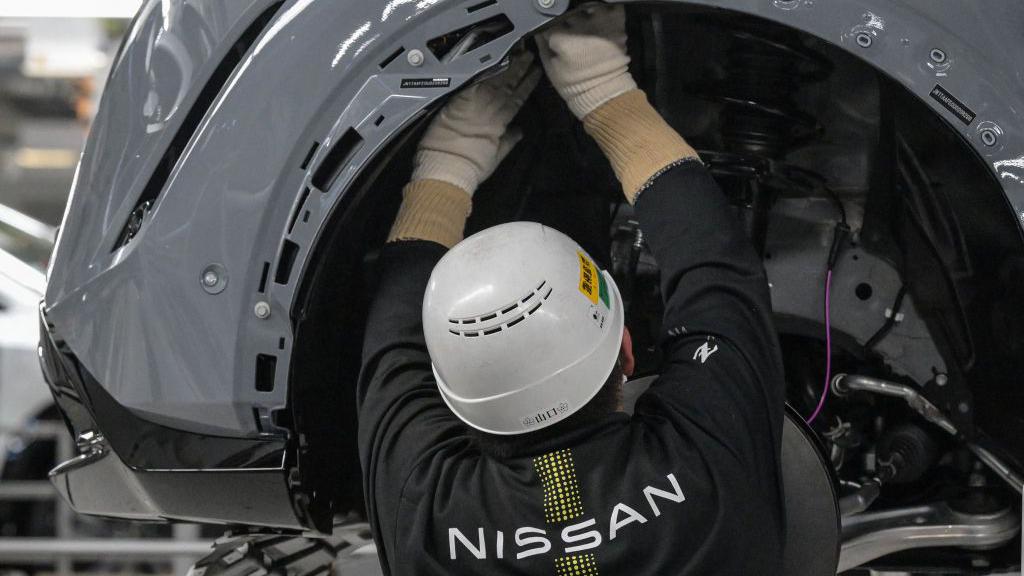
Nissan has announced plans to lay off thousands of workers and reduce its global production by 20% as part of a cost-saving strategy to address a sharp decline in sales, particularly in key markets like China and the United States. The Japanese carmaker revealed that it will cut approximately 9,000 jobs worldwide as part of its efforts to restructure the company in response to mounting financial pressures.
While Nissan has not provided specific details on where the job cuts will occur, it is known that the company employs more than 6,000 people at its manufacturing plant in Sunderland, North East England. Nissan’s decision to downsize comes after a significant revision to its financial forecast: the company has slashed its operating profit estimate for 2024 by 70%. This marks the second time this year that Nissan has downgraded its financial outlook, underscoring the challenges it is facing in the global automotive market.
Despite the tough measures, Nissan’s CEO, Makoto Uchida, sought to reassure stakeholders that these changes were necessary for the company’s long-term sustainability. “These turnaround measures do not imply that the company is shrinking,” Uchida stated. “Nissan will restructure its business to become leaner and more resilient.” In an effort to show solidarity with the company’s restructuring, Uchida also revealed that his monthly salary would be halved, with other senior executives facing similar pay reductions.
Nissan’s financial struggles were reflected in its stock performance, with shares dropping more than 6% on the Tokyo Stock Exchange in response to the news. The company’s troubles have been exacerbated by intense competition in China, which has become the world’s largest producer of electric vehicles (EVs). Foreign automakers, including Nissan, have found it increasingly difficult to compete with local Chinese manufacturers such as BYD, which have gained a strong foothold in the EV market.
“Nissan, like many Japanese carmakers, has been slow to embrace electrification in China, and this has been reflected in their poor results,” said Mark Rainford, a car industry commentator based in China. While Nissan has made strides with electric models in other markets, its late entry into China’s rapidly growing EV sector has left it at a competitive disadvantage. In addition, falling vehicle prices in China have pressured foreign manufacturers to reduce their prices, further eroding profitability.
Nissan is also facing challenges in the US, where the effects of inflation and rising interest rates have dampened demand for new vehicles. With fewer people able to afford new cars, automakers have been forced to slash prices, which has further squeezed profit margins. This shift in the market has made it more difficult for Nissan to maintain its previous levels of sales, leading to a reduction in production across the board.
In an attempt to recover from these setbacks, Nissan has focused its efforts on electric vehicles (EVs). Last November, the company unveiled a £2 billion ($2.6 billion) plan to produce three new electric car models at its Sunderland plant. The initiative includes the production of electric versions of Nissan’s popular Qashqai and Juke models, as well as the next generation of the electric Leaf, which is already manufactured at the facility. This shift to electric vehicles is part of a broader industry trend as carmakers look to adapt to changing consumer preferences and government regulations favoring cleaner, more sustainable transportation.
Despite these efforts to adapt to the changing market, Nissan’s restructuring plan reflects the reality of an increasingly competitive global automotive industry. The company’s struggle to keep pace with the rise of electric vehicles, particularly in China, has left it grappling with the challenges of maintaining profitability while investing in the future of mobility.
As part of its broader restructuring efforts, Nissan will also be focusing on streamlining its operations and reducing overhead costs. These changes are expected to help the company become more agile in responding to shifting market dynamics, but the job cuts and production reductions are a sign of the tough decisions being made to navigate through an uncertain future.
The next few years will be crucial for Nissan as it seeks to redefine its position in the global automotive market. The company is betting on its electric vehicle lineup to turn things around, but the path forward remains challenging, particularly as it faces pressure from both established competitors and new entrants in the EV space. Whether the company can execute its turnaround strategy successfully will depend on its ability to adapt quickly and regain consumer confidence in its brand.








